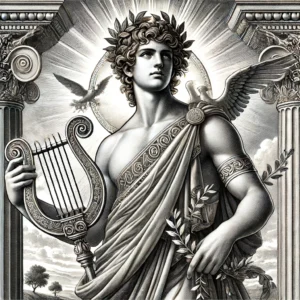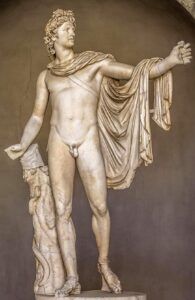Apollo is one of the twelve principal gods of Greek mythology, the son of Zeus and the goddess Leto. He is known by many names and roles in mythology, ranging from the god of the sun, light, arts, music, poetry, medicine, to prophecy. Here are some detailed facts about Apollo:
- Origins and Family:
- Apollo is the son of Zeus, the supreme god of Olympus, and Leto, a Titaness.
- He has a twin sister, Artemis, the goddess of hunting and the moon.
- Roles and Symbols:
- God of the Sun: Apollo is considered the god of the sun, often depicted driving the sun chariot across the sky each day.
- God of Light: He represents light and truth.
- God of Arts and Music: Apollo is the god of music, poetry, and the arts. He is often depicted with a lyre.
- God of Medicine and Healing: He has the power to heal and is considered the god of medicine.
- God of Prophecy: Apollo possesses the gift of prophecy and is the patron of the Oracle of Delphi.
- Symbols:
- Apollo is often depicted as a handsome, strong young man holding a lyre or a bow.
- Other symbols associated with him include the sun, laurel trees, and ravens.

- Famous Myths:
- Music Contest with Pan: Apollo competed with the god Pan in a music contest and won, affirming his position as the god of music.
- Love for Daphne: Apollo fell in love with Daphne, a nymph, who rejected his love and transformed into a laurel tree to escape him.
- Punishment of Niobe: Niobe, a mortal woman, boasted of having more children than Leto. Apollo and Artemis punished her by killing all her children.

Apollo is one of the most revered and widely worshipped gods in Greek mythology. He has extensive influence in various domains and plays a significant role in many mythological stories.

